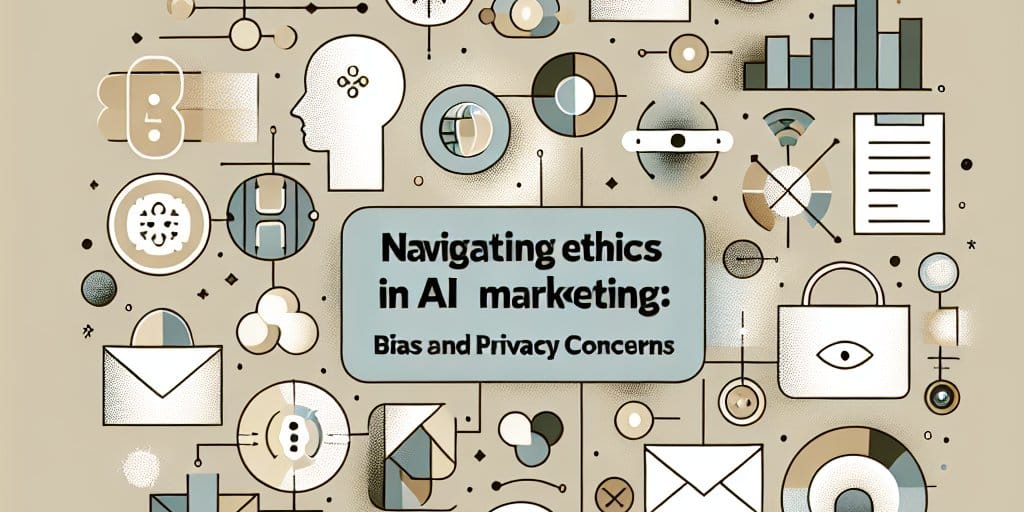The Ethics of AI in Marketing: Bias and Privacy in 2025
As we move deeper into the digital age, artificial intelligence (AI) continues to reshape the landscape of marketing. However, with great power comes great responsibility. The integration of AI in marketing practices raises significant ethical concerns, particularly regarding bias and privacy. In this comprehensive exploration, we delve into these issues as they are projected to evolve by the year 2025, shedding light on the ethical implications and necessary safeguards.
Understanding AI in Marketing
AI in marketing leverages machine learning, data analytics, and other automated processes to enhance marketing efforts. From personalized recommendations to predictive customer behavior models, AI's capabilities are vast. However, its application can inadvertently perpetuate biases or invade privacy if not carefully managed. In understanding the scope and potential of AI, marketers must navigate these ethical waters with precision and care.
The Bias Problem
Bias in AI essentially stems from the data it learns from. If the training data is biased, the AI's outputs, decisions, and predictions reflect these biases. In marketing, this can result in unfair targeting or exclusion of certain demographics.
Consider a hypothetical scenario where an AI system is used to target health insurance ads. If the training data over-represents one demographic over another, there is a risk that the AI will primarily target ads toward that over-represented group, potentially leading to disparities in information access and opportunities among different population segments.
"Bias in AI is not just a glitch in the system, it's a mirror to our society's prejudices that demands rigorous scrutiny and rectification."
To combat bias, AI systems must be designed with inclusivity in mind. This involves regular audits, updates to training datasets, and the integration of fairness algorithms. Moreover, transparency in AI processes allows consumers to understand how their data is being used and how decisions are being made.
Privacy Concerns in AI-Driven Marketing
The pervasive collection of personal data is central to AI's effectiveness in marketing. However, this raises significant privacy concerns. Consumers are increasingly wary of how their personal information is handled, stored, and protected.
By 2025, it is anticipated that privacy regulations will evolve to address these concerns more robustly. Marketers will need to adopt privacy-by-design approaches, ensuring that data protection is an integral part of the AI development process. This means implementing strong data encryption, secure data storage solutions, and transparent data usage policies.
Moreover, the concept of "minimal data usage" — using only the data necessary to achieve a specific purpose — will become a cornerstone of ethical AI marketing strategies. This approach not only protects consumer privacy but also builds trust between brands and their customers.
Future Projections and Ethical Practices
As we look ahead to 2025, the marketing industry must proactively address AI's ethical implications. This involves establishing a comprehensive ethical framework for AI in marketing, which includes:
- Continual updates and audits of AI systems to eliminate biases.
- Strengthening privacy protections to align with evolving regulations and consumer expectations.
- Enhanced transparency about how AI models function and how data is utilized.
Organizations like the AI Ethics Board are already working on such frameworks, providing guidelines and best practices for companies to follow.
Moreover, public awareness and understanding of AI's role in marketing need to be enhanced. This can be achieved through educational initiatives and open dialogues between consumers and businesses. Transparency not only demystifies AI but also empowers consumers to make informed decisions about their data.
In conclusion, while AI presents significant opportunities for innovation in marketing, its ethical use is paramount. By addressing bias and privacy concerns head-on, the marketing industry can harness AI's potential responsibly and ethically.
Further Reading
Explore more about the implications of AI in different sectors and best practices for ethical AI implementation:
- Effective AI Implementation Strategies
- AI's Role Across Different Industries
- Privacy Guidelines for AI Systems

